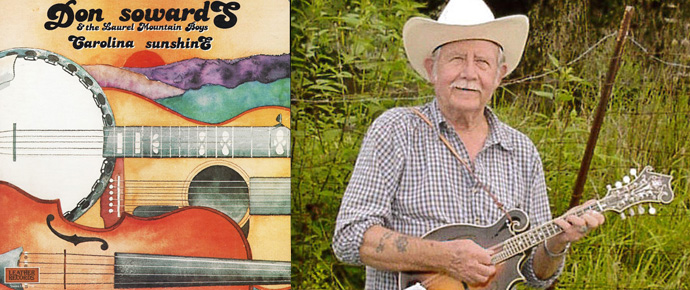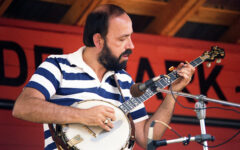
Don Sowards, leader of the Laurel Mountain Boys, an excellent song-writer, singer and fine mandolin player, passed away at his home in Charleston, West Virginia, on Friday, January 26, 2018. He was 87 years old.
Donald Ray Sowards, Sr. was born on December 4, 1930. He loved bluegrass music from an early age and quickly learned to play several instruments, although, the mandolin was his favorite. Sowards went on to be an innovator, making bluegrass music popular in West Virginia. He assisted countless musicians in writing songs and playing different instruments.
In 1961 Sowards worked with guitar player and singer Bill Duncan, leading the Harmony Mountain Boys, a band that went on to record two songs for a single released on the Rena label and an LP of original material, A Scene Near My Country Home: 16 Songs, released by King Records. Sowards, Duncan and banjo player Denver Jackson did a nine-month stint on WOAY-TV, licensed to Oak Hill, West Virginia.
The band seemed to have interchangeable leaders, sometimes having Don Sowards’ name or Bill Duncan’s fronting the Harmony Mountain Boys, who broke up soon afterwards.
After several years of relative inactivity, in 1974 Sowards organized another band, the Laurel Mountain Boys, later the Laurel Mountain Band and briefly even reunited with Bill Duncan.
Through the later part of the 1970s and into the 1980s he maintained an interesting group although their music veered away from a traditional style to a more progressive sound.
Don Sowards was an avid songwriter, penning Midnight Loneliness, I Call Her Sunshine, While I’m Gone and Long Black Beauty.
He formed The Laurel Mountain Boys Bluegrass Band, with his son, Mark, playing the banjo alongside him as the band travelled all over West Virginia, Ohio, Kentucky, and Virginia during the 1970s, 1980s and the 1990s. He had a beautiful tenor voice and sang lead on multiple albums that the band recorded.
Ohio based The Rarely Herd were significantly influenced by Sowards courtesy of guitarist Jim Stack, who was a member of the Laurel Mountain Boys in the late 1970s.
Sowards loved his country and was a proud United States Marine veteran, serving during the Korean War, during which he was wounded on three separate occasions. He was awarded three Purple Hearts for his bravery.
He retired from CSX Railroad in 1996 with more than 30-years-service.
Apart from bluegrass music, Sowards had many other interests; he was an oil painter, an arrowhead hunter, and a gun maker.
In 1995, 5 for the Gospel had a CD, He Rose Up Again, released on the Don Sowards Music label.
Paul Adkins remembers joining Sowards when Adkins was in his late 20s ….
“I was in Don’s band in the late 1970s. We recorded a 45rpm record of two songs per side. I honestly can’t remember the songs but I’m sure there were a couple of his original compositions and probably two traditional or cover songs.
Don was a very talented singer, song-writer and musician. He wrote dozens of songs and many were recorded by him and others. I recorded one of his compositions on an album I did on Rebel, titled I Call Her Sunshine…….a song he penned for his lovely wife.
His mandolin and singing style was somewhat reminiscent of John Duffey but was definitely his own unique personality.
We played mostly regional venues and festivals but Don was able to grow our music (bluegrass) through many other opportunities from his contacts with large and small local businesses. We played company picnics, town and city events around Charleston, and other cities in West Virginia.
In my opinion he is one of those that never got the recognition he deserves for his music. I’m thankful to have been among his many friends and was honored to be lead singer in his band.
He will be greatly missed by many.”
John Green, a former member of Sowards’ band and also a former member of the Lonesome River Band remembers ……..
“I worked with Don from around 1976 to 1979, not sure about the specific dates, but also worked with him for another stint in 1980 or 1981 for about a year. I recorded two albums with him on Old Homestead, Long Black Beauty, and another called The Green Rolling Hills of West Virginia that was never released.
Don was a very good song writer and taught me many things about song writing that I still use today. After I left the band I went on to write songs for the Lonesome River Band, and actually played the summer of 1990 with them, but never recorded with them.
I had not spoken to Don for several years until 2013 when I had open heart surgery and Don came and visited me twice while in the hospital. We talked for several hours each time laughing and crying about that period in both our lives. His son Mark and I have kept in contact since, and Mark is now playing banjo with the group Southridge from here in Hurricane, West Virginia.
I remember Don being a very good business man, and also a great tenor singer and a Monroe style mandolin player. I was very young then and we didn’t see eye to eye on things and that is the reason that I left the band. I told Don in our later meetings that I was young and didn’t understand a lot about the business and he laughed and said that he didn’t understand us kids either. He said that he wished that things had been different because he thought that band could have really gone far. I agreed.”
A Discography –
Sometime, Somewhere (Lemco LEM-055, released in 1976)
Long Black Beauty (Old Homestead OHS-90096, 1978)
Laurel Mountain Boys (Old Homestead OHS-90126, 1980)
Carolina Sunshine (Leather LBG-7710, 1980)







